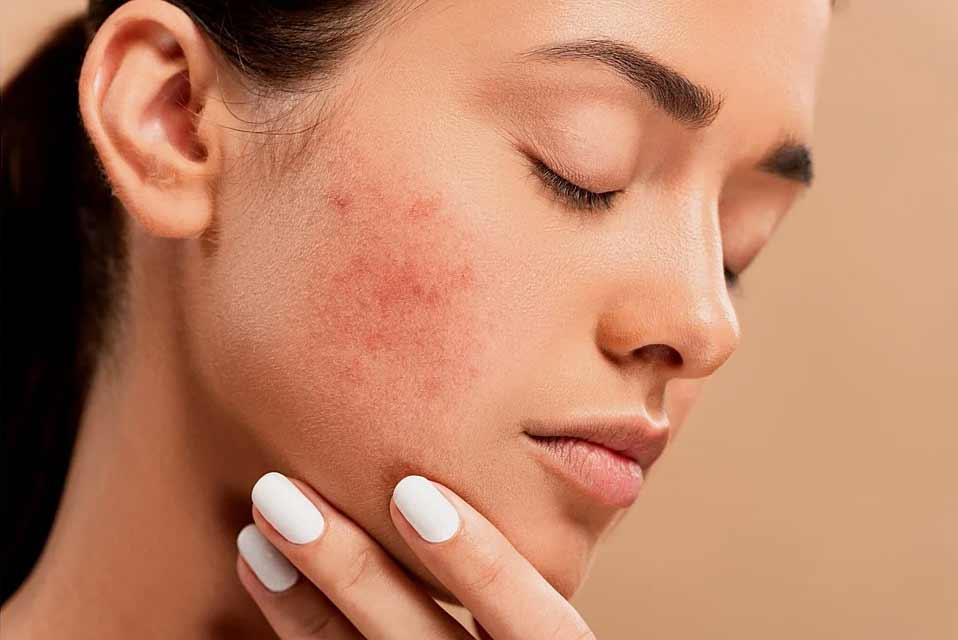Working Time
- Mon-Thu 08:00 - 20:00
Friday 07:00 - 22:00
Saturday 08:00 - 18:00
Contact Info
-
Phone: +918750828100
+918750822100 - lasercentreskin@gmail.com
Ask the Experts
Acne treatment

Acne typically appears on the face, neck, chest, back, and shoulders. Acne can be caused by hormonal changes, genetics, stress, and certain medications. Treatment options include topical and oral medications, as well as lifestyle changes such as a healthy diet and regular exercise.
Causes of Acne:
Hormonal Changes: Hormonal changes during puberty, menstrual cycle, and pregnancy can cause an increase in sebum production, leading to acne.
Genetics: Acne can be hereditary, meaning that if your parents had acne, you are more likely to develop it too.
Bacteria: Propionibacterium acnes is a type of bacteria that lives on the skin and can contribute to the formation of acne.
Diet: Certain foods like dairy, high-glycemic index foods, and chocolate have been linked to acne.
Stress: Stress can cause hormonal changes and increase inflammation in the body, leading to acne.
Risk Factors for Acne Breakouts:
Age: Acne is most common in teenagers and young adults.
Gender: Boys are more likely to develop severe acne than girls.
Family History: If your parents had acne, you are more likely to develop it too.
Medications: Certain medications like corticosteroids, lithium, and anticonvulsants can cause acne.
Identifying Types of Acne:
Whiteheads: Closed come dones that appear as small, white bumps on the skin.
Blackheads: Open comedones that appear as small, black dots on the skin.
Papules: Red, inflamed bumps that can be tender to the touch.
Pustules: Similar to papules, but contain pus in the center.
Nodules: Large, painful bumps that can develop deep under the skin.
Cysts: Large, pus-filled lesions that can cause scarring.
Areas Where Acne Can Develop:
Acne can occur anywhere on the body, but it most commonly appears on the face, neck, chest, and back.
Factors That Can Worsen Acne:
- Touching your face with your hands
- Using oily or greasy skincare products
- Wearing tight clothing or hats
- Exposure to high levels of humidity and sweating.
Getting Rid of Pimples:
- Prescription medications like topical retinoids and oral antibiotics
- In-office procedures like chemical peels and laser therapy
Complications of Acne Treatment
- Dryness and irritation of the skin.
- Increased sensitivity to the sun.
- Skin discoloration and scarring.
Acne Scars:
Acne scars are the result of damage to the skin caused by severe acne. They can be categorized as atrophic, hypertrophic, or keloid scars.
Getting Rid of Acne Scars:
- Over-the-counter treatments like silicone gels and creams.
- In-office procedures like microdermabrasion and laser therapy.
- Prescription medications like corticosteroids and retinoids.
Face Wash for Acne:
Look for a face wash that contains salicylic acid or benzoyl peroxide, which can help unclog pores and reduce inflammation.
- Moisturizer for Acne Prone Skin:
- Sunscreen for Acne Prone Skin:
- Look for a non-comedogenic sunscreen with an SPF of at least 30.
Additional Precautions:
Avoid touching your face: Touching your face can transfer bacteria and oils from your hands to your skin, which can contribute to acne breakouts. Try to avoid touching your face as much as possible, and use a clean towel or tissue to wipe your face if needed.
Keep your skin clean: Regularly washing your face with a gentle cleanser can help remove excess oil, dirt, and bacteria that can contribute to acne breakouts. However, be careful not to over-wash your face, as this can strip your skin of its natural oils and lead to dryness.
Avoid using harsh products: Using harsh skincare products, such as scrubs or astringents, can irritate the skin and worsen acne. Instead, choose gentle products that are non-comedogenic and won't clog your pores.
Wear sunscreen: Sun exposure can worsen acne and lead to hyperpigmentation, so it's important to wear sunscreen daily. Look for a non-comedogenic, oil-free sunscreen that won't clog your pores.
Maintain a healthy lifestyle: Eating a balanced diet, getting regular exercise, and managing stress levels can all help improve overall skin health and reduce the risk of acne breakouts.
Avoid squeezing or picking at pimples: Squeezing or picking at pimples can cause inflammation and increase the risk of scarring. It's best to leave pimples alone and let them heal naturally. If you're concerned about a particularly stubborn pimple, see a dermatologist for advice on how to safely treat it.
Why choose us?
Personalized treatment plans: We understand that each individual's skin is unique and requires a tailored approach to acne treatment. Our team of skincare experts will work with you to create a personalized treatment plan that meets your specific needs and goals.
Evidence-based approach: Our acne treatment protocols are based on the latest scientific research and evidence. We only use treatments that have been proven to be safe and effective for acne, ensuring that you receive the best possible care.
Comprehensive approach: Our acne treatment approach is comprehensive, addressing not just the symptoms of acne but also the underlying causes. We focus on improving overall skin health to prevent future breakouts and reduce the risk of scarring.
Experienced team: Our team of skincare experts has years of experience treating all types of acne, from mild to severe. We are committed to staying up-to-date with the latest treatments and techniques, ensuring that our patients receive the best possible care.
Supportive environment: We understand that dealing with acne can be challenging and stressful. Our team creates a supportive and welcoming environment, ensuring that our patients feel comfortable and confident throughout their treatment journey.
